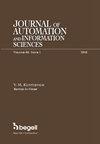GENERALIZED POISSON INTEGRAL AND ITS APPLIED ASPECTS
Q3 Engineering
Journal of Automation and Information Sciences
Pub Date : 2021-03-01
DOI:10.34229/1028-0979-2021-2-9
引用次数: 0
Abstract
Mathematical methods based on statistics have been used in sociology for a long time. The functioning of socio-economic and socio-politic systems is a complex process, which is caused by a number of various factors. Thus, the construction of models of socio-economic and socio-politic processes requires solving problems of both the decomposition of structures and processes, and their integration into a single system model, taking into account the changing conditions of the external environment. Mathematical modeling of such problems can be carried out by methods of network analysis or game theory, which allows finding optimal strategies for the behavior of competitive parties. Asymptotic formulations have a central role in game theory, since, due to the complex strategic nature, explicit solutions can be found only in very rare cases. A large number of models created to study complex social processes that occur in society are dynamical systems, or non-autonomous differential equations, or difference equations with a large number of parameters in any cases. In this situation, it is important to choose an appropriate tool for studying the behavior of such systems. In this paper, generalized Poisson delta operators are considered as approximating aggregates, since periodic processes, which are subdivided into harmonic and polyharmonic, provide the internal integrity of complex systems and their dynamic functioning. Questions of the asymptotic behavior of the exact upper bounds for approximations by generalized Poisson delta operators on classes of periodic functions that satisfy the Lipschitz condition are also studied. The received formulas provide a solution to the Kolmogorov-Nikol’ski problem for generalized Poisson delta operators and Lipschitz classes. The proof is based on the use of formulas that give integral representations of the deviations of linear methods generated by linear processes of summation of Fourier series on sets of periodic functions in the uniform metric obtained in the works of L.I. Bausov. The results can be an effective tool for modeling the processes of social dynamics.广义泊松积分及其应用
以统计学为基础的数学方法在社会学中应用已久。社会经济和社会政治系统的运作是一个复杂的过程,它是由许多不同因素造成的。因此,构建社会经济和社会政治过程的模型需要解决结构和过程分解的问题,并考虑到外部环境的变化条件,将其整合到单一系统模型中。这类问题的数学建模可以通过网络分析或博弈论的方法进行,这允许为竞争各方的行为找到最优策略。渐近公式在博弈论中具有核心作用,因为由于复杂的策略性质,明确的解决方案只能在非常罕见的情况下找到。为研究社会中发生的复杂社会过程而创建的大量模型,在任何情况下都是动态系统,或非自治微分方程,或具有大量参数的差分方程。在这种情况下,选择合适的工具来研究这类系统的行为是很重要的。本文将广义泊松算子看作近似聚集,因为周期过程提供了复杂系统的内部完整性及其动态功能,周期过程又被细分为调和过程和多调和过程。研究了满足Lipschitz条件的周期函数类上广义泊松算子逼近的精确上界的渐近性问题。所得公式为广义泊松算子和Lipschitz类的Kolmogorov-Nikol 'ski问题提供了一个解。这个证明是基于使用的公式,这些公式给出了由一致度量中周期函数集合的傅里叶级数和的线性过程产生的线性方法的偏差的积分表示,这是在L.I. Bausov的著作中得到的。研究结果可以作为对社会动态过程建模的有效工具。
本文章由计算机程序翻译,如有差异,请以英文原文为准。
求助全文
约1分钟内获得全文
求助全文
来源期刊

Journal of Automation and Information Sciences
AUTOMATION & CONTROL SYSTEMS-
自引率
0.00%
发文量
0
审稿时长
6-12 weeks
期刊介绍:
This journal contains translations of papers from the Russian-language bimonthly "Mezhdunarodnyi nauchno-tekhnicheskiy zhurnal "Problemy upravleniya i informatiki". Subjects covered include information sciences such as pattern recognition, forecasting, identification and evaluation of complex systems, information security, fault diagnosis and reliability. In addition, the journal also deals with such automation subjects as adaptive, stochastic and optimal control, control and identification under uncertainty, robotics, and applications of user-friendly computers in management of economic, industrial, biological, and medical systems. The Journal of Automation and Information Sciences will appeal to professionals in control systems, communications, computers, engineering in biology and medicine, instrumentation and measurement, and those interested in the social implications of technology.
 求助内容:
求助内容: 应助结果提醒方式:
应助结果提醒方式:


